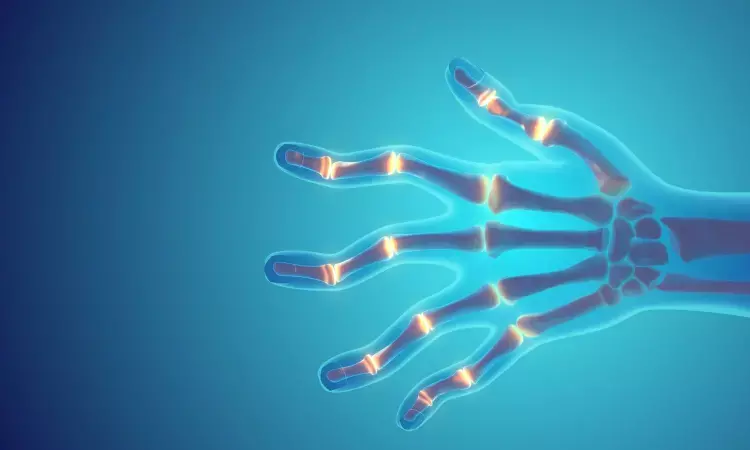- Home
- Medical news & Guidelines
- Anesthesiology
- Cardiology and CTVS
- Critical Care
- Dentistry
- Dermatology
- Diabetes and Endocrinology
- ENT
- Gastroenterology
- Medicine
- Nephrology
- Neurology
- Obstretics-Gynaecology
- Oncology
- Ophthalmology
- Orthopaedics
- Pediatrics-Neonatology
- Psychiatry
- Pulmonology
- Radiology
- Surgery
- Urology
- Laboratory Medicine
- Diet
- Nursing
- Paramedical
- Physiotherapy
- Health news
- Fact Check
- Bone Health Fact Check
- Brain Health Fact Check
- Cancer Related Fact Check
- Child Care Fact Check
- Dental and oral health fact check
- Diabetes and metabolic health fact check
- Diet and Nutrition Fact Check
- Eye and ENT Care Fact Check
- Fitness fact check
- Gut health fact check
- Heart health fact check
- Kidney health fact check
- Medical education fact check
- Men's health fact check
- Respiratory fact check
- Skin and hair care fact check
- Vaccine and Immunization fact check
- Women's health fact check
- AYUSH
- State News
- Andaman and Nicobar Islands
- Andhra Pradesh
- Arunachal Pradesh
- Assam
- Bihar
- Chandigarh
- Chattisgarh
- Dadra and Nagar Haveli
- Daman and Diu
- Delhi
- Goa
- Gujarat
- Haryana
- Himachal Pradesh
- Jammu & Kashmir
- Jharkhand
- Karnataka
- Kerala
- Ladakh
- Lakshadweep
- Madhya Pradesh
- Maharashtra
- Manipur
- Meghalaya
- Mizoram
- Nagaland
- Odisha
- Puducherry
- Punjab
- Rajasthan
- Sikkim
- Tamil Nadu
- Telangana
- Tripura
- Uttar Pradesh
- Uttrakhand
- West Bengal
- Medical Education
- Industry
COMP a novel predictor of CVD and CAD in RA

Patients with rheumatoid arthritis (RA) have a higher risk of developing cardiovascular disease (CVD).
A study published in BMC Rheumatology concluded that circulating Cartilage oligomeric matrix protein (COMP) could serve as a potential predictor of cardiovascular disease (CVD) and coronary artery disease (CAD) in Rheumatoid arthritis. Individuals with active disease for at least two years following RA diagnosis, as well as those with cumulative disease activity, are at a higher risk for CVD and CAD, regardless of traditional CVD risk factors.
This study aimed to determine if baseline serum COMP, patient characteristics, traditional CVD risk factors, and disease activity over time can predict CVD in early RA patients. The study included 233 patients with early RA, recruited between 1995 and 2005. Cox regression was used to assess potential predictors of CVD and CAD.
Key findings from the study are:
- A first-ever diagnosis of CVD and CAD occurred in 70 and 52 patients, respectively.
- Age, sex, hypertension and diabetes predicted CVD and CAD.
- There was an association between COMP and increased risk of CVD and CAD with crude hazard ratios per SD 1.45 and 1.51respectively.
- When adjusted for age, sex, hypertension, diabetes and ESR, results were similar but did not reach significance with HRs 1.32 and 1.35, respectively.
- Baseline disease activity did not independently predict CVD.
- High DAS28 (> 5.1) at two years was associated with an increased risk of subsequent CVD [adjusted HR 2.58] and CAD.
- ESR and CRP at two years and cumulative disease activity over two years independently predicted CVD and CAD.
The study's main limitation was the small sample size that affected the multivariate analyses' statistical power.
High levels of systemic inflammation and disease activity score in 28 joints (DAS28) after diagnosis, as well as cumulative disease activity, were associated with increased risk of CVD and CAD, independent of traditional CVD risk factors, they added.
Awareness of the particularly increased risk of heart disease among difficult-to-treat patients is important to improve cardiovascular-related outcomes in Rheumatoid arthritis patients.
Reference:
Rydell et al. Cardiovascular disease risk in early rheumatoid arthritis: the impact of cartilage oligomeric matrix protein (COMP) and disease activity. BMC Rheumatol 7, 43 (2023). https://doi.org/10.1186/s41927-023-00367-2
BDS, MDS in Periodontics and Implantology
Dr. Aditi Yadav is a BDS, MDS in Periodontics and Implantology. She has a clinical experience of 5 years as a laser dental surgeon. She also has a Diploma in clinical research and pharmacovigilance and is a Certified data scientist. She is currently working as a content developer in e-health services. Dr. Yadav has a keen interest in Medical Journalism and is actively involved in Medical Research writing.
Dr Kamal Kant Kohli-MBBS, DTCD- a chest specialist with more than 30 years of practice and a flair for writing clinical articles, Dr Kamal Kant Kohli joined Medical Dialogues as a Chief Editor of Medical News. Besides writing articles, as an editor, he proofreads and verifies all the medical content published on Medical Dialogues including those coming from journals, studies,medical conferences,guidelines etc. Email: drkohli@medicaldialogues.in. Contact no. 011-43720751


